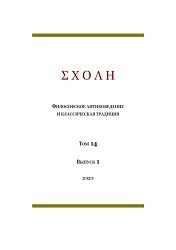Pseudo-platonic immortality: Axiochus and its posterity in humanism
Pseudo-platonic immortality: Axiochus and its posterity in humanism
Author(s): José María Zamora CalvoSubject(s): Metaphysics, Social Philosophy, Existentialism, Ontology
Published by: Новосибирский государственный университет
Keywords: Axiochus; immortality of the soul; consolation; Pedro Díaz de Toledo; Beatus Rhenanus;
Summary/Abstract: The aim of this article is to trace the influence of Axiochus, an apocryphal text attributed to Plato, on Humanism. The dialogue, which belongs to the literary genre of “consolation”, addresses the theme of contempt of death and the immortality of the soul. The jurist Pedro Díaz de Toledo (1410/15 – 1466) translated it into Spanish in 1444 from a Latin version entitled De morte contemnenda, which Cencio de’ Rustici had translated eight years earlier, probably from the Greek codex provided by Joannes Chrysoloras, the Vaticanus gr. 1031. For his part, the humanist Beatus Rhenanus (1485 – 1547), the owner of five editions, revised and corrected in detail the text of a translation by Rudolf Agricola, proposing a number of amendments and changes that would appear in the Basel edition printed by Adam Petri in 1518.
Journal: ΣΧΟΛΗ. Философское антиковедение и классическая традиция
- Issue Year: XIV/2020
- Issue No: 1
- Page Range: 38-56
- Page Count: 19
- Language: English

